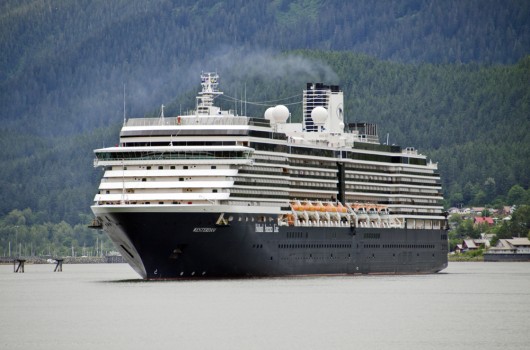
The Holland America Cruise Ship Westerdam prepares to dock in Juneau July 16, 2012. (Photo by Heather Bryant/KTOO)
Alaska lawmakers are considering sending a message to the federal government urging it to allow ships to bypass Canada on Alaska cruises this year.
Earlier this year, Canadian officials extended the country’s ban on large cruise ships in the country’s waters. That put the 2021 Alaska cruise season in doubt, because U.S. law doesn’t allow the foreign-flagged cruise ships that typically sail the Inside Passage to run domestic routes.
“The Alaska visitors’ industry, particularly cruise tourism, is the cornerstone of Southeast Alaska’s economy. Prior to the pandemic, Alaska had over 2.2 million visitors in 2019. Cruise ships bring roughly half of the visitors to our state,” Rep. Dan Ortiz (I-Ketchikan) told the state House Transportation Committee Saturday.
Ortiz said that after a devastating 2020 with no cruise visitors, another season without the big ships could do lasting damage to the state’s economy.
“While many businesses were able to hibernate for 2020, the threat of no or limited business in 2021 could do irreparable harm,” he said.
So he and other state lawmakers are pushing for a resolution that would ask Congress and the Biden administration to allow large cruise ships to bypass a Canadian stop. The measure would add the Legislature’s to a growing chorus of voices calling for federal action, but would not carry the force of law.
Alaska’s congressional delegation has introduced a bill that would allow ships to skip calls in Canada. But that bill hasn’t gone anywhere yet.
Federal maritime law, though, isn’t the only thing standing in the way of a 2021 Alaska cruise season.
Even if Congress or the Biden administration waived the 19th-century law that requires a foreign stop, the federal Centers for Disease Control would need to sign off before cruise ships can start sailing from U.S. waters again.
Sen. Jesse Kiehl (D-Juneau) has championed the resolution in the Senate, and he told the House Transportation Committee on Tuesday that the measure would not pressure the CDC to allow cruises to resume.
The resolution “simply asks that that be a decision Americans can make, that the CDC can make about safety, but that it not be — and again, for a short period — that it not be a decision we are forced into because of Canada’s action with regard to their ports and waters,” Kiehl said.
Rep. Kevin McCabe (R-Big Lake) said Saturday that he’s “generally in support” of the measure, but he said he’s concerned about setting a bad precedent by waiving laws that protect the domestic shipping industry.
“I’m very nervous that we allow the camel’s nose under our tents, so to speak, by allowing foreign vessels to operate point-to-point in the United States,” McCabe said.
Provincial officials in British Columbia have expressed similar concerns. Canadian media reports that some are worried that if cruise ships bypass Canada this summer, they might not return next year. But the authority to open or close Canada’s ports to cruise ships rests with Canada’s federal government, not B.C.’s.
Alaska lawmakers from both parties emphasized that the request is for temporary relief, not a permanent change.
Shannon Adamson of the International Organization of Masters, Mates and Pilots stopped short of opposing the resolution outright. But she pointed out that the state owns its own vessels that meet both CDC and federal maritime law requirements: Alaska Marine Highway System ferries.
“We should be utilizing AMHS vessels that are currently tied up in Ketchikan to boost tourism in Southeast Alaska and help our communities through a difficult time,” she said.
She suggested the state could use the Columbia, which is currently scheduled for an overhaul over the summer.
In an email to KRBD, state transportation spokesperson Sam Dapcevich threw cold water on the idea — he said the marine highway system doesn’t have enough crewmembers to operate the Columbia this summer. And besides, he said, based on current reservations, the state doesn’t see a need to add the Columbia to the summer schedule.








